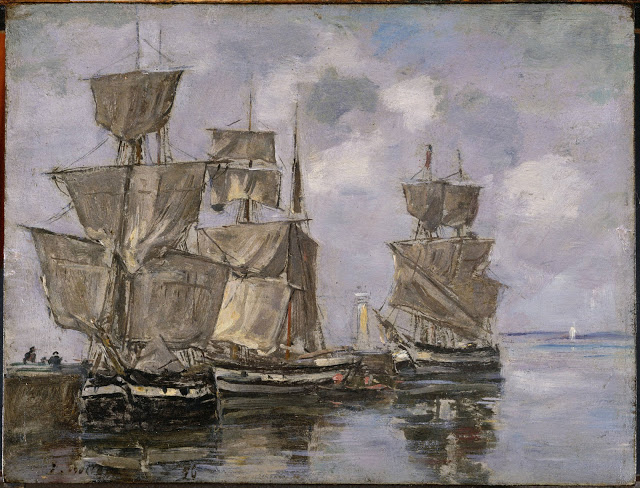Eugène Boudin, (1824–1898)
Navires dans le Port à Honfleur/ Ships in the Port at Honfleur, c. 1856
Oil on wood panel
Height: 20.3 cm (8 in). Width: 26.5 cm (10.4 in).
Princeton University Art Museum
Honfleur is a commune in the Calvados
department in northwestern France. It is located on the southern bank of the
estuary of the Seine across from le Havre and very close to the exit of the
Pont de Normandie. Its inhabitants are called Honfleurais.
It is
especially known for its old, beautiful picturesque port, characterized by its
houses with slate-covered frontages, painted many times by artists, including
in particular Gustave Courbet, Eugène Boudin, Claude Monet and Johan Jongkind,
forming the école de Honfleur which contributed to the appearance of the
Impressionist movement. The Sainte-Catherine church, which has a bell tower
separate from the principal building, is the largest church made out of wood in
France.
Located on the estuary of one of the principal rivers of
France with a safe harbour and relatively rich hinterland, Honfleur profited
from its strategic position from the start of the Hundred Years' War. The
town's defences were strengthened by Charles V in order to protect the estuary
of the Seine from attacks from the English. This was supported by the nearby
port of Harfleur. However, Honfleur was taken and occupied by the English in
1357 and from 1419 to 1450. When under French control, raiding parties often
set out from the port to ransack the English coasts, including partially
destroying the town of Sandwich, in Kent, England, in the 1450s. More on Honfleur
Eugène Louis Boudin; 12 July 1824 – 8
August 1898) was one of the first French landscape painters to paint outdoors.
Boudin was a marine painter, and expert in the rendering of all that goes upon
the sea and along its shores.
Born at
Honfleur, Boudin was the son of a harbor pilot, and at age 10 the young boy
worked on a steamboat that ran between Le Havre and Honfleur. In 1835 the
family moved to Le Havre, where Boudin's father opened a store for stationery
and picture frames. Here the young Eugene worked, later opening his own small
shop. In his shop, in which pictures were framed, Boudin came into contact with
artists working in the area and exhibited in the shop their paintings. At the
age of 22 he started painting full-time, and traveled to Paris the following
year and then through Flanders. In 1850 he earned a scholarship that enabled
him to move to Paris, although he often returned to paint in Normandy and, from
1855, made regular trips to Brittany.
In 1857/58
Boudin befriended the young Claude Monet, then only 18, and persuaded him to
give up his teenage caricature drawings and to become a landscape painte. The
two remained lifelong friends and Monet later paid tribute to Boudin’s early
influence. Boudin joined Monet and his young friends in the first Impressionist
exhibition in 1873, but never considered himself a radical or innovator.
Late in his life he returned to the south of
France as a refuge from ill-health, and recognizing soon that the relief it
could give him was almost spent, he returned to his home at Deauville, to die
within sight of Channel waters and under the Channel skies he had painted so
often. More
on Eugène Louis Boudin
Images are copyright of their respective owners, assignees or others. Some Images may be subject to copyright
I don't own any of these images - credit is always given when due unless it is unknown to me. if I post your images without your permission, please tell me.
I do not sell art, art prints, framed posters or reproductions. Ads are shown only to compensate the hosting expenses.
If you enjoyed this post, please share with friends and family.
Thank you for visiting my blog and also for liking its posts and pages.





No comments:
Post a Comment